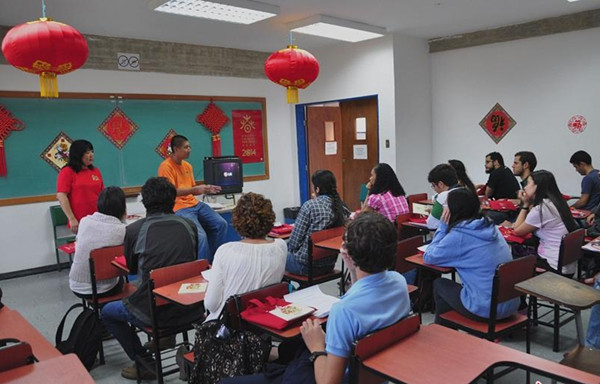The Chinese New Year - Just Share It contest provided a chance for participants from all over the world to tell their stories of the Spring Festival. We received entries from across the globe and are pleased to show these original works –stories, photos and videos– on our website. After a grueling selection process and tough discussions, we have shortlisted the potential winners. Some of the submissions have been edited for style and context.
To select the winners, we invite you to choose the best contributions made by fellow readers. Although a minimum of three works will be shortlisted, but you can pick more. Help us share and spread the beauty of Chinese New Year to the world. You can find out more about voting details here.
Chinese New Year through my lens
Updated: 2015-03-11 16:10
 |
|
[Photo/People.cn] |
By Rashida Anis
Before sharing my experience about Chinese New Year, I must introduce myself. After starting my career as a post graduate, I got the opportunity to work in China as a researcher and a coordinator at a private research organization in Islamabad. For the last seven years, while holding the China desk, I have been coordinating with Chinese delegations, most of whom are visiting scholars and official delegates. The “2015 Year of the Sheep” refreshed the memories of my experience of coordinating the celebration of “2014 Year of the Horse.”
It was the year 2013 when Mr. Xiao Jianming joined us as a visiting scholar. Mr. Jianming is a professor by profession. His wife is a Mandarin Chinese language expert, and was accompanying her husband. However, to utilize her time productively and considering her expertise in Chinese language, she started a Chinese language course for those Pakistanis who wanted to learn Chinese. It was a unique activity, because we mostly do research on political and economic issues and social interaction is limited at the scholarly level. Therefore, this change was refreshing. Fortunately, our project launching a Chinese language course started quite smoothly. Mrs. Jianming was adept in her teaching skills. Despite being unaware of the national language (Urdu) and with much less familiarity with English, she taught so skillfully that students very soon started learning Chinese and also learned about the rich and diverse Chinese culture.
At the start of February 2014, Mrs. Xiao introduced Chinese New Year, which begins on the second new moon after the winter solstice and ends on the full moon fifteen days later. She told us that Chinese New Year is one of the most important events for the people in China and it brings the longest public holidays in the country. She said that 2014 was the Year of the Horse, which signifies ‘good luck.’ Mr. and Mrs. Jianming said they were also born in the Year of the Horse, so it always makes them more happy and excited. They wore a red colored locket and also placed a hanging on the door where they lived. Mr. Xiao said that pasting god’s image on the door is an important Chinese custom during the Spring Festival.
We realized that both guests were homesick and knowing the importance of New Year for them, we arranged a New Year celebration. We gathered in the classroom and after class we celebrated Chinese New Year. Mr. and Mrs. Xiao showed a video that Chinese official TV had released in the evening of Chinese New Year, a formal beginning of New Year Gala. After that they showed a few more videos related to Chinese history and New Year. The event ended with refreshments and good wishes for everyone. I can still feel the delicious taste of the dumplings we had at the reunion dinner. Today, while remembering that small event that added to my knowledge, I also learned that mutual interaction is a good way to learn about each other’s norms and customs. Besides, I also realized that Pakistan and China are two neighboring countries having friendly diplomatic ties but much less information about each other’s culture and history.
I also developed an interest in knowing about other world civilizations and major festivals like holi, which is celebrated at the end of the winter season, on the last full moon day of the lunar month Phalguna. Christmas, the celebration of the birth of Jesus Christ which conveys his message of love, tolerance and brotherhood and Eid at the end of Ramadan, when Muslims throughout the world observe a joyous three-day celebration called Eid al-Fitr. I realized that festivities are an important part of human life, for their mental and physical relaxation, and for connecting humanity. However, I found Chinese New Year quite unique. The 4,000-year- old festival presents an historical tradition of spreading love and care for others and reviving the importance of family bonding by presenting gifts, having fun and eating special cuisine with your friends and family. It can surely keep you lively and happy until the next year.
This year, when the largest human migration on the face of this planet is about to start as our Chinese friends are on their way to their native cities and hometowns for celebrating Lunar New Year, I wish good luck and greetings to all. I am thankful to China Daily for inviting us to share experiences and ideas. I feel blessed and proud to know about Chinese New Year. Nevertheless, my target for the “Year of Monkey” is overloaded as I intend to know more about the majesty and honor of the Chinese civilization.
[Photo/People.cn]
Media Support: | Chinadaily.com.cn | Ecns.cn | People's Daily Online | xinhua.net | |China.org.cn | |cntv.com | |CRI.cn |
